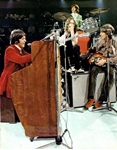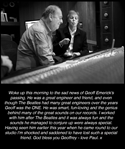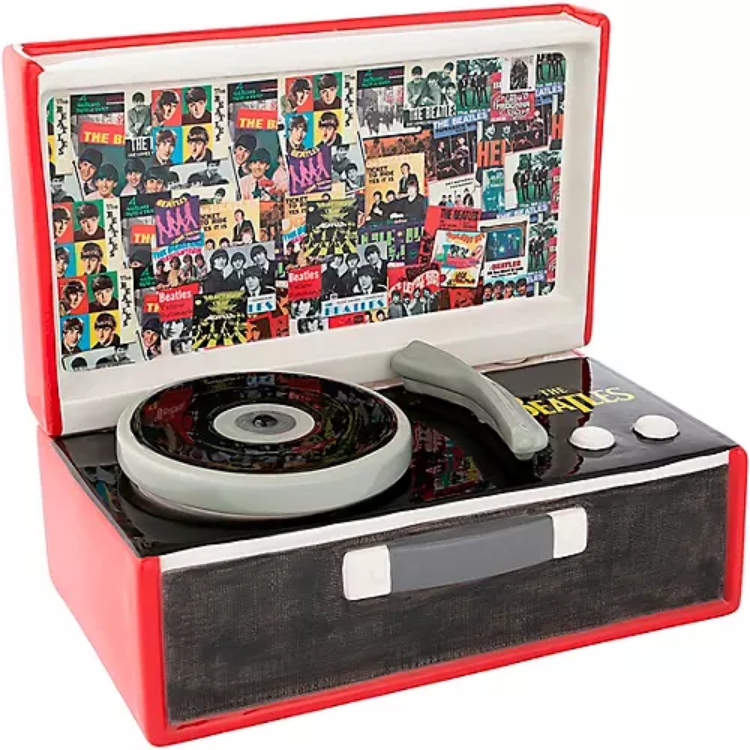- Register
- Log in to Tune-In
- Wishlist (0)
-
Shopping cart
(0)
You have no items in your shopping cart.
Beatles News

A short film inspired by one of the most infamous conspiracy theories in rock has been released.
The Paul Is Dead conspiracy originally kicked off when Sgt. Pepper was released, where the back cover pictured McCartney with his back to the camera, next to the words ‘Without You’, as if he'd been replaced for the session by a doppelganger. It gathered pace following the release of Abbey Road, where a series of supposed clues hinted at McCartney's apparent demise.
Paul Is Dead tells the story of what might have happened had the cheery mop top actually died. Rather than taking its cue directly from the conspiracy, which has McCartney perishing in a car accident, the film places the band a retreat in the Lake District, where he passes away after an unintended drug mishap. The remaining Beatles set out to replace the dead musician with a local singer, Billy Sheers, and to secretly bury the deceased atop a nearby hill.
Source: By Scott Rowley/loudersound.com
details

For the most part the original name of the their self-titled album “The Beatles,” got an additional tag and has been universally re-christened, “The White Album,” and for one really good reason, the sleeve is all white!
As far as “re-releases” go and the never ending “deluxe” album packages that have flooded the market, this is one I am truly looking forward to! This was “the” Beatles album that I was able to get lost in. I grew up on my Mom’s record collection so the Fab Four (among a slew of other Rock artist) was predominate in my life. (Thanks Mah!)
On Friday, November 9th the 50th anniversary of The Beatles White Album will take place and is one date I am seriously looking forward to. Hell the expanded version of Helter Skelter alone is worth the price of admission, and if that wasn’t enough the legendary (pronounced eee-sher) “Esher Demos” are part of the package as well!
Source: Haze/nh1.com
details
London's world famous AIR Studios, originally founded by Beatles producer Sir George Martin in 1969, has been sold to a Russian investor for an undisclosed sum.
The studio was put up for sale earlier this year by its owners Richard Boote and Paul Woolf, both aged in their late 60s, who wanted to pass it on to someone younger who could grow the business.
Its new owner has not been officially named, but Billboard understands it to be Maxim Demin, a Russian businessman who has fully owned British Premier League soccer club Bournemouth since 2013.
The Financial Times has also named Demin -- a low profile figure who does not give press interviews and is believed to have made his fortune in the petrochemicals industry -- as AIR's buyer. The studio, based at Lyndhurst Hall in Hampstead, North London, is yet to comment.
Source: Richard Smirke/Billboard
details
Expansive new mixes, and newly unearthed demos and alternates of John Lennon’s chart-topping 1971 album “Imagine” were publicly unveiled before a sold-out audience at L.A.’s Grammy Museum on Wednesday night.
The event at the museum’s Clive Davis Theatre — featuring appearances by remix engineer Paul Hicks, director Andrew Solt, drummer Jim Keltner, and Lennon friend and confidant Elliot Mintz — prefaced Friday’s release of Capitol’s major new boxed set devoted to the album, and Eagle Vision’s DVD and Blu-ray re-release of Solt’s feature documentaries “Imagine: John Lennon” and “Gimme Some Truth.”
The evening aptly began with a clip of Lennon, alone in Ascot Sound Studios at his Tittenhurst Park estate in England, hurling himself into the roaring lead vocal for the key “Imagine” track “Gimme Some Truth.”
Source: Chris Morris/variety.com
details
Beginning in January, a new UCLA course will tell the story of the Beatles through the prism of film. Offered by the UCLA Herb Alpert School of Music’s music industry program, the class will screen documentaries, television appearances and feature films — and students will hear firsthand accounts from industry executives and musicians, further illuminating the visual and aural record of the legendary band.
The course, “The Reel Beatles,” is open to undergraduate and graduate students. It will be taught by David Leaf, an award-winning filmmaker and biographer, who was a co-writer, director and producer of the 2006 documentary “The U.S. vs. John Lennon.”
Source: Ariane Bicho / newsroom.ucla.edu
details

In 1968, Yoko Ono and John Lennon shocked Beatles fans with the release of their experimental album Two Virgins. Fifty years later, the world is finally catching up with Ono.
For decades, she was unfairly blamed for the Fab Four’s breakup, and her art and songwriting abilities routinely dismissed by the press. But that blame has been exposed as knee-jerk rock-world misogyny, and Ono’s avant-pop work, both with and without her late husband, has been embraced by a new generation. Her 1973 album Feeling the Space—chronicling the feminist struggles of the ’70s and envisioning an end to “2,000 years of male society”—seems radically prescient today. And her surrealist wisdom and anti-war agitation have made her a Twitter favorite.
Source: Zach Schonfeld /newsweek.com
details
Geoff Emerick, the Grammy Award-winning engineer and producer who was the Beatles’ chief recording engineer during their career, died Tuesday of heart failure, according to his manager William Zabaleta. He was 72.
While he worked with many artists over the course of his long career — including Elvis Costello. Badfinger, Supertramp, Cheap Trick and America, among many others — his work with the Beatles and the solo Paul McCartney stands apart.
Paul McCartney remembered his longtime colleague and friend in a pair of posts on social media and on his website today. In the social media post, he wrote, “Though the Beatles had many great engineers over the years, Geoff was the ONE.”
The statement on his website follows in full below:
Geoff Emerick (1946 – 2018)
Source: Variety
details
A STRIKING waterside home built on the site of a bungalow John Lennon bought for his beloved aunt has been put on the market for £7.25million — and is likely to be quickly snapped up.
Two spectacular homes backing on to Poole Harbour in Sandbanks, Dorset, have already sold this summer for a combined £15.65million.
And now this Californian-style home, renamed Imagine, has become available following a no-expense-spared renovation and remodelling.
John Lennon bought Harbour’s Edge, as it was then called, for £25,000 in 1965 as a gift for his beloved Aunt Mimi, who had helped raise the famous musician.
When he died in 1980, Mimi discovered her nephew hadn’t updated the deeds. She passed away in 1991 and Yoko Ono took over the property, promptly selling it.
Source: metro.news
details
Hey, Emma!
La La Land star Emma Stone accidentally revealed on Oct. 1 that she will appear in an upcoming video for former Beatle Paul McCartney’s next single.
The news came during a Q&A panel with the Child Mind Institute where Stone opened up about her battle with anxiety, which she has been struggling with since the age of 7.
Prior to wrapping his session with the actress, moderator Dr. Harold S. Koplewicz asked the actress “what’s next?" And before the star had a chance to answer, Koplewicz quickly added, “besides a video with Paul McCartney.”
“I don’t think you’re supposed to announce that,” Stone said in response to Koplewicz.
The actress also said she's working on a sequel to Zombieland.
Source: Natalya Jaime/hollywoodreporter.com
details
Geoff Emerick was just a lad of 19 when he became the Beatles’ engineer, bringing his own brash approach to the experimentation the band was beginning to try in the studio. The immediate result: Revolver, the 1966 masterpiece that forever changed pop music. “A lot of that was down to Geoff Emerick,” producer George Martin told Mojo in 2007. “He brought a new kind of mind to the recordings, always suggesting sonic ideas, different kinds of reverb, what we could do with the voices. He was quite prepared to break rules. ‘You call that top? This is top!’ he’d say, turning [the dial] all the way round.” At Abbey Road, still a formal environment where the technicians wore white lab coats, Emerick meant trouble. “He was always experimenting and the bosses at EMI didn’t like it,” Martin says. “He got severely reprimanded when they found him putting a microphone in a pail of water to see what the effect was. I loved that freedom of thought.”
Source: Rolling Stone
details
Geoff Emerick, the Beatles studio engineer who entered the music business in his mid-teens and by his early 20s had helped make history through his work on such landmark albums as “Revolver” and “Sgt. Pepper’s Lonely Hearts Club Band,” has died. He was 72.
Abbey Road Studios, home to the Beatles and many other recording artists, confirmed the death Wednesday and vowed to ensure that Emerick’s legacy lives on. Colleague William Zabaleta told Variety that Emerick collapsed and died Tuesday while they were talking on the telephone. He said Emerick had suffered from heart problems in recent years. Paul McCartney, in an online tribute Wednesday, wrote that Emerick “had a sense of humor that fitted well with our attitude to work in the studio and was always open to the many new ideas that we threw at him. He grew to understand what we liked to hear and developed all sorts of techniques to achieve this. ... We spent many exciting hours in the studio and he never failed to come up with the goods.”
Source: By Gregory Katz/washingtonpost.com

When money flowed like water in the music industry, album recording budgets were as big as they needed to be. To soak up that money, expensive state-of-the-art recording studios were built all over the world.
In 1979, Beatles’ producer George Martin decided to expand his Associated Independent Recording Studios–henceforth AIR Studios–to the island of Monserrat in the northeast Caribbean.
It was an astounding facility. Everyone from The Rolling Stones and Elton John to Black Sabbath and Lou Reed hired the live-work studio. Dire Straits’ Brothers in Arms, one of the best-sounding CDs of all time, was made there.
Source: Alan Cross/ajournalofmusicalthings.com
details
John Lennon- the man whose songs and ideologies have ruled a millennial's life at some point in time, be it through the meaningful lyrics that touched a million chords with his audience or his active pacifism and rebellion against the society, that inspired an entire generation of young men and women of his time and after.
John Lennon continues to live on, not only through his classic compositions but also through his distinguished way with words, which have served to make many of us make sense of this world and our lives a little better.
The following quotes by the legend, will not only guide your experiences in the ever mind-boggling 20s, but will also help you take on life with a pinch of salt:
1. “Life is what happens to you when you're busy making other plans.”
Source: mensxp.com
details
Paul McCartney is a living testimonial to the virtues of being a vegetarian. The 76-year-old remains as vital as ever, with Freshen Up world tour dates scheduled into next year, and a new album titled Egypt Station. It's been five years since McCartney's last album of new songs, but he's no slacker. The record is nearly an hour long, not including several bonus tracks available in different formats. It's all prime Macca, with stylistic shifts and well-crafted songs to carry you along. Ever mindful of honoring the legacy of The Beatles, Sir Paul explained the record's title and concept on his website: "I liked the words 'Egypt Station.' It reminded me of the 'album' albums we used to make...'Egypt Station' starts off at the station on the first song, and then each song is like a different station. So it gave us some idea to base all the songs around that. I think of it as a dream location that the music emanates from."
Source: Mark Simmet/iowapublicradio.org
details
Giles Martin says his father, producer George Martin, would wince whenever a fan would say that the “White Album” was their favorite Beatles’ record.
The late George Martin would recall how tough it was to make the sprawling double album, titled “The Beatles” but given its familiar nickname because of the all-white cover. His son is in charge of a 50th anniversary repackaging that is due out Nov. 9.
“He liked things to be organized, and the ‘White Album’ wasn’t organized,” Giles Martin said recently.
The Beatles worked through the summer of 1968, often in exhausting all-night sessions. As evidence of the time spent, the new package includes the 102nd take of “Not Guilty,” a Harrison song that wasn’t even included among the 30 cuts of the original album.
Source: snopes.com
details
